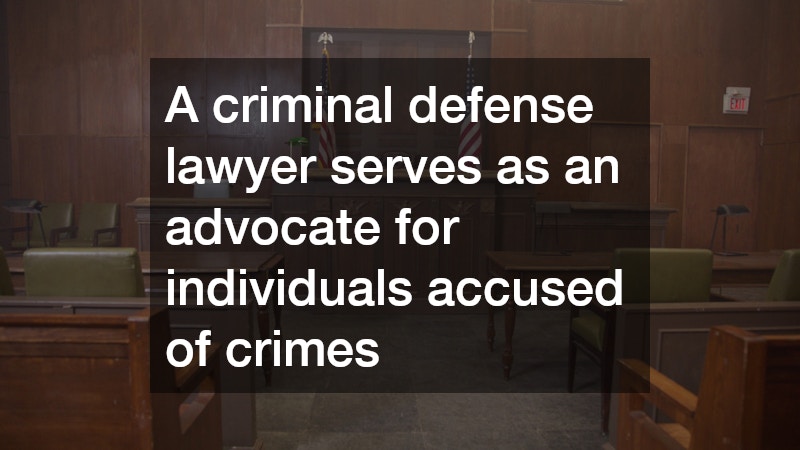Facing criminal charges can be a stressful and overwhelming experience. Whether it’s a minor infraction or a more serious offense, the decisions you make early in the process can significantly impact the outcome of your case. One of the most important steps a defendant can take is consulting a skilled criminal defense lawyer. These legal professionals develop strategies tailored to the specifics of each case, ensuring that your rights are protected and that you have the best possible chance for a favorable outcome.
Understanding the Role of a Criminal Defense Lawyer
A criminal defense lawyer serves as an advocate for individuals accused of crimes. Their role extends beyond simply representing clients in court—they investigate the case, identify weaknesses in the prosecution’s evidence, and develop strategic defenses based on legal precedent and the circumstances of the alleged crime.
Experienced lawyers also advise clients on how to interact with law enforcement, manage communications, and make critical decisions regarding plea bargains, trial strategies, and potential sentencing outcomes.
Each case is unique, and a criminal defense lawyer tailors their approach based on the type of charge, the evidence involved, and the client’s long-term goals. For common charges, there are several tried-and-tested strategies that defense attorneys employ to protect their clients’ rights and improve their chances of success.
Strategies for DUI and Traffic-Related Offenses
Driving under the influence (DUI) is one of the most common criminal charges, and it requires specialized legal defense. A criminal defense lawyer will often start by examining the legality of the traffic stop, ensuring that law enforcement followed proper procedures. If there were procedural errors, such as a lack of probable cause for the stop or improper administration of sobriety tests, these can be grounds to challenge the charges.
Additionally, DUI defenses may involve scrutinizing breathalyzer or blood test results. Laboratory errors, calibration issues, and mishandling of evidence can all be used to weaken the prosecution’s case. In some instances, negotiating a plea agreement to a lesser offense may be the most practical approach, especially when the evidence is strong.
Defending Against Theft and Property Crimes
Theft, burglary, and related property crimes often hinge on intent and access to the property in question. A criminal defense lawyer frequently investigates the details of the alleged incident, reviewing surveillance footage, witness statements, and police reports to identify inconsistencies.
One common strategy is challenging the prosecution’s evidence regarding intent. If the lawyer can demonstrate that the alleged act was accidental, misunderstood, or lacking criminal intent, the charges may be reduced or dismissed. For example, cases involving alleged shoplifting may be defended by showing that the item was inadvertently misplaced or that the client had permission to possess it.
Strategies for Drug-Related Offenses
Drug charges range from possession to distribution, and defense strategies vary depending on the severity and context of the offense. A criminal defense lawyer may challenge the legality of the search or seizure that led to the discovery of illegal substances. Evidence obtained without a valid warrant or through improper procedures can often be suppressed, weakening the prosecution’s case.
In addition, defense attorneys may investigate whether the substances were actually illegal or if the quantity attributed to the defendant is accurate. Expert witnesses, forensic analysis, and procedural reviews are frequently used to build a solid defense. In cases involving first-time offenders, plea negotiations or diversion programs may be pursued to minimize long-term consequences.
White-Collar Crime and Fraud Defense
White-collar crimes, including fraud, embezzlement, and identity theft, often involve complex financial transactions and documentation. Defense strategies for these cases usually include thorough audits of financial records and collaboration with forensic accountants.
A criminal defense lawyer may identify discrepancies in the evidence, procedural errors in the investigation, or misinterpretations of financial documents. Demonstrating a lack of intent to commit fraud or challenging the interpretation of regulations can be effective strategies. In some cases, negotiating settlements or deferred prosecution agreements may be advisable, particularly when the defendant has a strong professional reputation and minimal prior record.
The Importance of Early Legal Representation
One common thread across all criminal charges is the importance of securing a skilled criminal defense lawyer as early as possible. Early involvement allows the attorney to gather evidence, interview witnesses, and develop a proactive strategy before the prosecution has fully built its case. Waiting too long can limit defense options and negatively impact the outcome.
A proactive defense often focuses not only on challenging the charges but also on minimizing collateral consequences, such as employment impacts, professional licensing issues, or immigration concerns. Experienced attorneys understand the broader implications of criminal convictions and work to protect clients’ long-term interests.
Navigating criminal charges requires expertise, strategic thinking, and careful planning. Whether dealing with DUI, theft, assault, drug offenses, or white-collar crimes, a criminal defense lawyer plays a crucial role in safeguarding your rights and pursuing the most favorable resolution possible. From scrutinizing evidence to negotiating plea agreements and presenting compelling arguments in court, these professionals provide essential guidance through one of the most challenging experiences a person can face.
